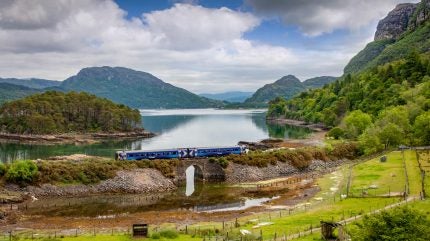
Network Rail and ScotRail have unveiled a five-year climate action plan for the railway network in Scotland that aims to reduce emissions and protect the country’s rail lines from the effects of climate change.
The plan, published under Scotland’s Railway partnership, details five “priority areas” for the network, including environmental management, biodiversity, social value, and climate readiness.
The two organisations also focused on net zero in the plan, detailing their ambition to reach net zero across the network’s total footprint by 2045, and across its scope 1 and 2 emissions, operations under its direct control, by 2030.
Liam Sumpter, managing director of Network Rail Scotland, said the network was already feeling the impact of climate change, he said: “Extreme weather is impacting passengers, freight customers and communities more frequently than ever.
“We’ve developed this plan for the next five years, aiming to serve Scotland – now and in the future – with a greener, more resilient and responsible railway.”
The plan highlighted that weather in Scotland has become warmer and more frequently extreme with the average annual temperature increasing by around 0.8 degrees Celsius and average rainfall increasing by more than 100mm a year, compared to the 20th century.

US Tariffs are shifting - will you react or anticipate?
Don’t let policy changes catch you off guard. Stay proactive with real-time data and expert analysis.
By GlobalDataAs a result, the report states that around £109m has been paid out by Network Rail to cover disruptions from track closures due to high winds, flooding and snow in Scotland since 2006, providing an additional cost benefit to improving climate resilience on the network.
The issue of climate disruption was notably highlighted earlier this year when ScotRail temporarily suspended all of its services after multiple severe storms hit the country in January and damaged or blocked infrastructure across the network.
Actions outlined by Network Rail to protect the railway included training staff to make better decisions on network resilience, continuing asset renewal and refurbishment programmes, and developing “adaptation pathways” to understand the long-term climate investment needed for the railway.
Scotland’s Railway said the adaptation pathway plans will be published by 2027 for sections of the network deemed to be most susceptible to the impacts of climate change and need a “more transformational approach” to improving resilience.
The partnership’s plan highlighted the need to reduce the network’s own environmental impact. It said ScotRail would achieve its emissions targets both directly through actions such as improving energy efficiency and indirectly by capturing emissions through biodiversity and offsetting schemes.
Joanne Maguire, managing director of ScotRail, said: “Taking climate action is one of our priorities and we’re making great progress through the decarbonisation of the network, identifying ways to eliminate fossil fuel use, increasing energy efficiency, and deploying renewable energy sources in our buildings.”
The plan echoes commitments made by Network Rail in its five-year plan for the entire UK rail network during Control Period 7, where it described climate change as the “biggest challenge” facing the organisation.



